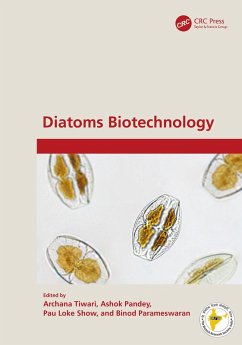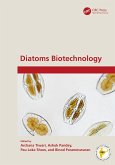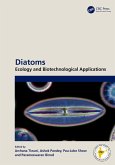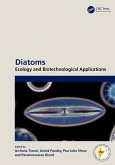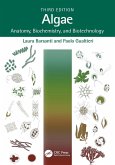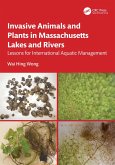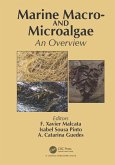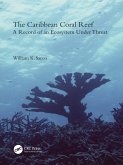Diatoms Biotechnology (eBook, ePUB)
Redaktion: Tiwari, Archana; Parameswaran, Binod; Show, Pau Loke; Pandey, Ashok
170,95 €
170,95 €
inkl. MwSt.
Sofort per Download lieferbar

85 °P sammeln
170,95 €
Als Download kaufen

170,95 €
inkl. MwSt.
Sofort per Download lieferbar

85 °P sammeln
Jetzt verschenken
Alle Infos zum eBook verschenken
170,95 €
inkl. MwSt.
Sofort per Download lieferbar
Alle Infos zum eBook verschenken

85 °P sammeln
Diatoms Biotechnology (eBook, ePUB)
Redaktion: Tiwari, Archana; Parameswaran, Binod; Show, Pau Loke; Pandey, Ashok
- Format: ePub
- Merkliste
- Auf die Merkliste
- Bewerten Bewerten
- Teilen
- Produkt teilen
- Produkterinnerung
- Produkterinnerung

Bitte loggen Sie sich zunächst in Ihr Kundenkonto ein oder registrieren Sie sich bei
bücher.de, um das eBook-Abo tolino select nutzen zu können.
Hier können Sie sich einloggen
Hier können Sie sich einloggen
Sie sind bereits eingeloggt. Klicken Sie auf 2. tolino select Abo, um fortzufahren.

Bitte loggen Sie sich zunächst in Ihr Kundenkonto ein oder registrieren Sie sich bei bücher.de, um das eBook-Abo tolino select nutzen zu können.
This book covers biotechnology and applications of diatoms including various applications like the use of diatom biogenic silica in drug delivery and their cultivation for wastewater remediation. It contains case studies in diatom biorefinery and provides information about the bioactive compounds, antioxidants, and lipids from diatoms.
- Geräte: eReader
- mit Kopierschutz
- eBook Hilfe
Andere Kunden interessierten sich auch für
![Diatoms Biotechnology (eBook, PDF) Diatoms Biotechnology (eBook, PDF)]() Diatoms Biotechnology (eBook, PDF)170,95 €
Diatoms Biotechnology (eBook, PDF)170,95 €![Diatoms (eBook, ePUB) Diatoms (eBook, ePUB)]() Diatoms (eBook, ePUB)195,95 €
Diatoms (eBook, ePUB)195,95 €![Diatoms (eBook, PDF) Diatoms (eBook, PDF)]() Diatoms (eBook, PDF)196,95 €
Diatoms (eBook, PDF)196,95 €![Algae (eBook, ePUB) Algae (eBook, ePUB)]() Laura BarsantiAlgae (eBook, ePUB)113,95 €
Laura BarsantiAlgae (eBook, ePUB)113,95 €![Invasive Animals and Plants in Massachusetts Lakes and Rivers (eBook, ePUB) Invasive Animals and Plants in Massachusetts Lakes and Rivers (eBook, ePUB)]() Wai Hing WongInvasive Animals and Plants in Massachusetts Lakes and Rivers (eBook, ePUB)170,95 €
Wai Hing WongInvasive Animals and Plants in Massachusetts Lakes and Rivers (eBook, ePUB)170,95 €![Marine Macro- and Microalgae (eBook, ePUB) Marine Macro- and Microalgae (eBook, ePUB)]() Marine Macro- and Microalgae (eBook, ePUB)49,95 €
Marine Macro- and Microalgae (eBook, ePUB)49,95 €![The Caribbean Coral Reef (eBook, ePUB) The Caribbean Coral Reef (eBook, ePUB)]() William K. SaccoThe Caribbean Coral Reef (eBook, ePUB)51,95 €
William K. SaccoThe Caribbean Coral Reef (eBook, ePUB)51,95 €-
-
-
This book covers biotechnology and applications of diatoms including various applications like the use of diatom biogenic silica in drug delivery and their cultivation for wastewater remediation. It contains case studies in diatom biorefinery and provides information about the bioactive compounds, antioxidants, and lipids from diatoms.
Dieser Download kann aus rechtlichen Gründen nur mit Rechnungsadresse in A, B, BG, CY, CZ, D, DK, EW, E, FIN, F, GR, HR, H, IRL, I, LT, L, LR, M, NL, PL, P, R, S, SLO, SK ausgeliefert werden.
Produktdetails
- Produktdetails
- Verlag: Taylor & Francis eBooks
- Seitenzahl: 216
- Erscheinungstermin: 31. Oktober 2023
- Englisch
- ISBN-13: 9781000962925
- Artikelnr.: 68789561
- Verlag: Taylor & Francis eBooks
- Seitenzahl: 216
- Erscheinungstermin: 31. Oktober 2023
- Englisch
- ISBN-13: 9781000962925
- Artikelnr.: 68789561
- Herstellerkennzeichnung Die Herstellerinformationen sind derzeit nicht verfügbar.
Dr Archana Tiwari is an Associate Professor at Amity Institute of Biotechnology, Amity University, Noida, India. She obtained a Ph.D. degree from Allahabad, a Gold medalist, and a distinction holder in Botany. Her key research interests include Phycoprospecting Diatoms for wastewater remediation and high-value products. She has been working on Algal Biotechnology for two decades and the research work has been published in 70 International Journals with high impact factors. She has also authored ten books and several chapters in Springer, Wiley Blackwell, Elsevier on Algae and its applications. Prof Ashok Pandey is a Distinguished Scientist at CSIR-Indian Institute for Toxicology Research, Lucknow, India, and Honorary Executive Director at the Centre for Energy and Environmental Sustainability- India. He also holds the positions of Guest Professor in Jiangnan University, Wuxi, China; Adjunct Professor at VIT University, Vellore, Tamil Nadu; Adjunct Professor at MAC FAST, Thiruvalla, Kerala and Adjunct Professor at Kalaslingam University, Krishnan Koil, Tamil Nadu. He has been Visiting Professor/Scientist and UNESCO Professor in many countries, including France, Brazil, the UK, Switzerland, Malaysia, Thailand, etc. Formerly, he was Eminent Scientist at the Center of Innovative and Applied Bioprocessing, Mohali, and Chief Scientist & Head of Biotechnology Division at CSIR's National Institute for Interdisciplinary Science and Technology at Trivandrum. His major research and technological development interests are in industrial and environmental biotechnology, which span from biomass to fuels & chemicals, waste to wealth/energy, industrial enzymes, the solid-state fermentation, etc. Professor Pandey has around 1200 publications/communications, including 16 patents, 54 books, 130 book chapters, 465 original and review papers. Prof Pau-Loke Show is a Professor in Biochemical Engineering from the University of Nottingham, Malaysia. His research interests cover upstream to downstream bioprocessing, microalgae technology, and circular economy. Professor Show has published over 550 research papers and more than 200 contributions to international congresses, 3 books, and a few patents that are currently applied in the industry. Prof Show has received numerous prestigious academic awards from national and international organizations. He is now serving as an Editor-in-chief in Current Nutrition & Food Science, Editor in Scientific Report, Biocatalysis and Agricultural Biotechnology, Associate Editor at Bioengineered; Current Biochemical Engineering, and Editorial board member in several journals. Dr Parameswaran Binod is a Principal Scientist in the Microbial Processes and Technology Division of CSIR-National Institute for Interdisciplinary Science and Technology, Trivandrum, India. He obtained Ph.D. in Biotechnology from the University of Kerala, Thiruvananthapuram, India. He worked as a Post-doctoral fellow at the Korea Institute of Energy Research, Daejeon, South Korea. He joined as a scientist at the CSIR-National Institute for Interdisciplinary Science and Technology, Thiruvananthapuram, India. He has more than 140 publications to his credit. His name is listed in the world's top two percent scientists as per a study by Stanford University and Elsevier in the year 2020. He is a recipient of several awards and fellowships including the Young Scientist Award from International Forum on Industrial Bioprocesses (IFIBiop), France, Kerala State Young Scientist Award from Kerala State Council for Science, Technology, and Environment, Prof S B Chincholkar Memorial Award of the Biotech Research Society, India, Elsevier Impactful Research Award, Elsevier Renewable Energy Best Paper Award, Visiting Fellowship, EPFL, Switzerland, Marie Curie Fellow, etc. He is a Fellow of the International Society for Energy, Environment and Sustainability (ISEES). He is a National Honorary Advisory Board Member of Centre for Energy and Environmental Sustainability (CEES), India, and Central Office Executive of The Biotech Research Society, India.
Chapter 1. Diatom biogenic silica for drug-delivery applications
Chapter 2. Bioactive compounds from diatoms
Chapter 3. Genetic engineering of diatoms: innovations and future perspectives
Chapter 4. Lipids from diatoms
Chapter 5. Photonic materials from diatoms
Chapter 6. Case studies in diatom biorefinery
Chapter 7. Extraction technologies from diatoms
Chapter 8. Antioxidative compounds from diatom
Chapter 9. Wastewater remediation potential of diatoms
Chapter 10. Cultivation of diatoms for wastewater remediation: opportunities and challenges
Index
Chapter 2. Bioactive compounds from diatoms
Chapter 3. Genetic engineering of diatoms: innovations and future perspectives
Chapter 4. Lipids from diatoms
Chapter 5. Photonic materials from diatoms
Chapter 6. Case studies in diatom biorefinery
Chapter 7. Extraction technologies from diatoms
Chapter 8. Antioxidative compounds from diatom
Chapter 9. Wastewater remediation potential of diatoms
Chapter 10. Cultivation of diatoms for wastewater remediation: opportunities and challenges
Index
Chapter 1. Diatom biogenic silica for drug-delivery applications
Chapter 2. Bioactive compounds from diatoms
Chapter 3. Genetic engineering of diatoms: innovations and future perspectives
Chapter 4. Lipids from diatoms
Chapter 5. Photonic materials from diatoms
Chapter 6. Case studies in diatom biorefinery
Chapter 7. Extraction technologies from diatoms
Chapter 8. Antioxidative compounds from diatom
Chapter 9. Wastewater remediation potential of diatoms
Chapter 10. Cultivation of diatoms for wastewater remediation: opportunities and challenges
Index
Chapter 2. Bioactive compounds from diatoms
Chapter 3. Genetic engineering of diatoms: innovations and future perspectives
Chapter 4. Lipids from diatoms
Chapter 5. Photonic materials from diatoms
Chapter 6. Case studies in diatom biorefinery
Chapter 7. Extraction technologies from diatoms
Chapter 8. Antioxidative compounds from diatom
Chapter 9. Wastewater remediation potential of diatoms
Chapter 10. Cultivation of diatoms for wastewater remediation: opportunities and challenges
Index
